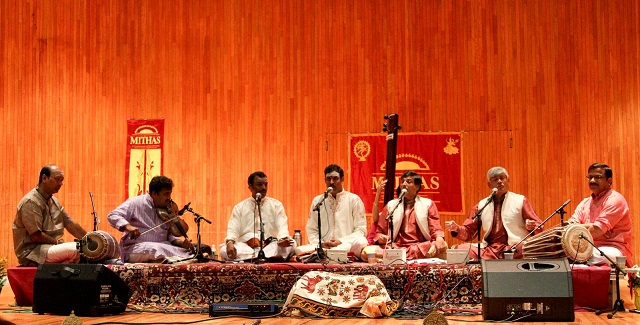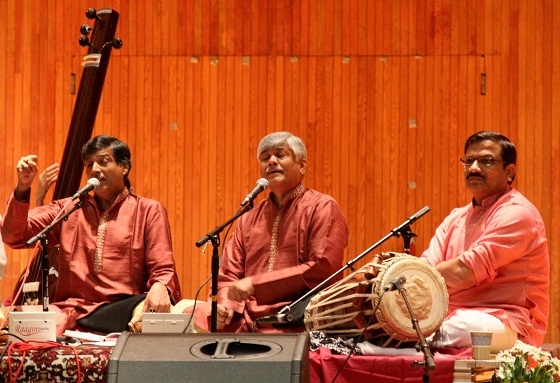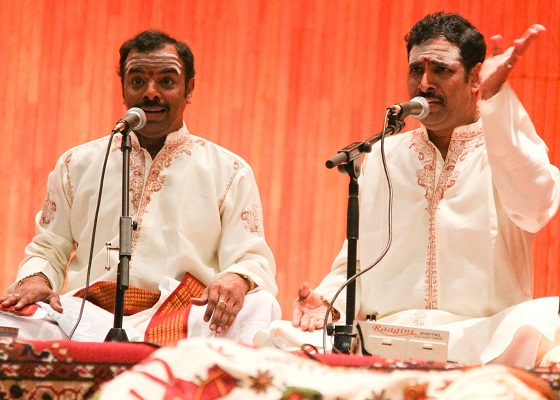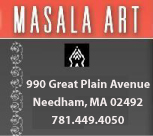Contribute
| A Duet In Perfect Accord: An Evening Of Carnatic-Dhrupad Euphony |
Haribabu Arthanari and Deepti Navaratna
09/15/2011
(This article is sponsored by Masala Art)
The Fall season for MITHAS this year has indeed started on a high note as a harbinger for a stellar series to come. Expectations ran high of this very unique musical experiment; in addition to being a harder-to-find Carnatic-Dhrupad jugalbandi, it was a duet of duo singers as well. Carnatic vocalists Malladi Sreeramprasad and Malladi Ravikumar, were set to unravel the many mystiques of a shared musical legacy with Ramakant and Umakant Gundecha - in true celebration of the protoplasmic unity across Indian classical musics. Musical experiments such as jugalbandis within the Indian Classical music microcosm are at best educative; they demonstrate how Indian classical music draws upon some common semantics and musical wisdom, despite structural and aesthetic differences. Such experiments have to effectively navigate the challenge of trying to converse musically while negotiating native differences in expression, intonation, compositional priori and improvisational formats. As compared to the Carnatic-Hindustani jugalbandi, a Carnatic-Dhrupad experiment has less to navigate and more to gain. Dhrupad music, as performed today shares many complementary features to Carnatic music, such as comparable improvisational modes, percussion accompaniments (mridangam vs pakhavaj), and extended lyrical content in compositions. The similarity in using rhythmic pulses during melodic improvisation, be it nom-tom alaap in Dhrupad or tanam in Carnatic is also striking. Yet, it took the combined geniuses of the Malladi brothers and Gundecha brothers to elevate this effort into a truly remarkable listening experience, in addition to forging means to speak musically across distinct traditional prerogatives. The concert began with verses from the Rig Veda by the Gundecha brothers, in the raga Bhairav, as if alluding to the source of it all. Malladi brothers followed it up with a sprightly Nattai unleashing a glimpse of the musical fireworks to come. They started with a slokam in praise of Thyagaraja written by his disciple Wallajapet Venkataramana Bhagavathar. This was followed by “Ninne Bhajana†a composition of Thyagaraja in the same raga. The fleeting use of Chathusruthi Dhaivatha (sharp Dha) in the chittaswaram was apt. This was followed by an Ahir Bhairav-Chakravakam conversation where the artistes seamlessly pieced together comparable composition sections and improvisational imperatives to great effect. Another notable feature was that both brothers attempted to reveal parallels between swara singing and bol-bant improvisations; the Gundecha brothers took a shot at kalpanaswarams on the go! The compositions were Thyagaraja’s “Sugunamule†in the raga Chakravakam and “Shabdha Prathama Om Kara Varana Prathama Aakar†in the raga Ahir Bhairav. The next raga-orthologs chosen were Kamavardhini and Puriya Dhanashree, the transition to a pratimadyama raga creating a contrasting mood. Malladi brothers chose Dikshitar’s masterpiece “Ramanatham Bhajeham†(raga Kashiramakriya in Dikshitar’s school) a composition on Lord Siva at Rameswaram. The Gundecha Brothers presented “Aayo Mana Haath Sab†a composition of poet Padmakar. The neraval was beautifully orchestrated, almost melding the soundscapes of the two ragas. After a brief intermission, the Gundecha Brothers launched into a sedate Sivaranjani followed by a brisk composition“Sandhya Sanjeevani, Sur Samadhi Roopiniâ€. The piece-de-resistance was a raagam-taanam-pallavi(RTP) in Megh-Madhyamavati, both pentatonic scales (Sa, Ri, Ma, Pa, Ni, Sa). There was perfect make-and-break of melodic tension as the singers alternated in the alaap sections, akin to a river that knows both spate and quietude. The taanam section made for some mind-blowing listening experience; the intonation-laden nom-tom alaap was balanced by the sculpted textures and patterns of the Carnatic taanam. Unmistakably, it was a titillating experience to see similar scales draped alternatively in the Carnatic and Dhrupad aesthetic, as the raga essays emerged. The pallavi “Mahalakshim Bhajaree Manasa Madhava Manohari Satatam†was inspired from a composition of Dikshitar and the residing deity of the Framingham temple, Mahalakshmi set to Adi talam. The tani avartanam by Neyveli Narayanan (Mridangam) and Vidwan Akilesh Gundecha (Pakwaj) was scintillating and the brought the audience to their feet. Being the 10th anniversary of 9/11, the Malladi Brother presented a meditative “Maithreem Bajhatha†by Chandrasekarendra Sarashwathi Swamigal of Kanchi Kaamakoti Peetam in the ragam Yamuna Kalyani. The song applauds timeless messages seeking peace such as: “Renounce War†The composition resonated with sentiments of one and all on the solemn occasion. The evening came to an end with all the four artists singing “Shankara Girija Pathi†a traditional Dhrupad composition in the raga Malkauns. Violinist HN Bhaskar deserves a special mention for his absolutely brilliant solo repartees, phenomenal phrasing and the ease with which he followed both the styles faithfully.
“Renounce unnecessary Competition for Powerâ€
“Give up Aggression on others' properties which is wrongâ€
“Mother Earth is wide enough and ready to give us all we desire like a Kaamadenuâ€
You may also access this article through our web-site http://www.lokvani.com/



